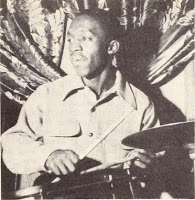Art Blakey's Messengers – December 22 1947
Michael Cuscuna – 1991 CD Reissue Liner Notes
This album is completed by another octet, which was an offshoot of a big band. The band was Art Blakey and the 17 Messengers, a group made up primarily of Moslem musicians who drafted Blakey as the leader. On December 27 (sic), 1947, an abbreviated edition of the ensemble recorded four titles for Blue Note: Kenny Dorham's "The Thin Man", "Bop Alley" by trumpeter Talib Dawud of the Gillespie band, Musa Kaleem's 'Musa's Vision" and "Groove Street", a vehicle for baritone saxophonist Ernie Thompson. It should also be noted that the alternative take of "Bop Alley" on this album is a later one than the master take.
Certainly, Dorham, Blakey, Sahib Shihab and Walter Bishop are well known and prolific contributors to the music since the forties. About the others, little is known. Musa Kaleem (born Orlando Wright) resurfaced in the late fifties, playing baritone sax in James Moody's band and playing flute on a Tiny Grimes-Coleman Hawkins date for Prestige and an unissued Dizzy Reece session. Horace Silver recorded his tune "Sanctimonious Sam" in 1963.
Shihab, like James Moody, was born in Savannah, Georgia in 1925, a coincidence too tempting to let pass. Shihab has always been a unique soloist with a rhythmic sense all his own and a disarmingly dry tone. He and Blakey worked beautifully together on Thelonious Monk's first record date, just one month before this Messengers session. They appeared together again under Monk's leadership in 1951. It is on those dates that the work of these two men during this period can be better assessed.
Dorham was already a mature and assured player by this time and a true improviser who approached a tune completely differently with each succeeding take. Of course, the musical collaboration of KD and Blakey would make history some nine years later with the formation of the Jazz Messengers.
If the Jazz Messengers were almost without peers in launching and defining hard bop and imbedding the quintet format in the public's mind, James Moody throughout the fifties steadfastly maintained a septet rooted in the tradition of these bebop octets. But by 1963, he disbanded and joined Dizzy Gillespie' quintet. Economics figures far more prominently in evolution of art than many would care to admit.
 |
| Art Blakey |
Photos: Francis Wolff
The Record Changer July 1948
Here's a wild one, in a style quite representative of the way the newer musicians are playing right now.
This swashbuckling crew, in a real whoopee mood, is highly exciting on MUSA'S VISION. Blakey practically propels them through the studio walls, and they keep it up. Most of these men are relative unknowns; some of them will continue to be, for one reason and another, but some will be big men soon. Besides Blakey, about whom I have expressed myself at length already, the name most likely to become a household word is Edmund Gregory (although the name he uses is Shahab, for reasons won't enlarge upon here), the alto man. He's a very talented guy.
Orlando Wright is a good tenor man, and a very unorthodox one, as he demonstrates in taking his own tune apart (an original tune it is, too). He comes out of the ensemble like an air-raid siren, and plays with tremendous drive, which is the general key of the whole record, Some complex trumpet by McKinley Durham, a man highly regarded by musicians. is followed by a Wild interlude by Shahab, and then the excellent ensemble, which gets a rich sound from the inclusion of trombonist Howard Bowe and baritonist Ernest Thompson. This music falls into no category—it's intensely modern, intensely uninhibited, and thoroughly enjoyable.
THE THIN MAN is not so good. They never find the same groove they have the reverse, and in a couple of places the solos don't come off. Rowe, for instance, sounds like the way Kai Winding is playing now, which mean unwieldily. The best part of the side is the ensemble work and the arranged backgrounds, which are unusual. Oddly enough, Durham's trumpet intro is much like one of Louis's breaks on SWEETHEARTS ON PARADE. (Blue Note 545,) (P.R.)
Down Beat 16 June 1948 Volume 15 Issue 12
The enthusiasm on these sides in which Howard Bowe, Edmund Gregory, Orlando Wright and Ernest Thomson are featured is more than contagious but unfortunately the solos are too rough for finished shellac. Both are small band boppers with some moments of enjoyment but not enough of them. (Blue Note 545)
Session Information
Kenny Dorham, trumpet; Howard Bowe, trombone; Edmund Gregory, alto sax; Orland Wright, tenor sax; Ernest Thompson, baritone sax; Walter Bishop Jr., piano; LaVerne Barker, bass; Art Blakey, drums.
WOR Studios, NYC, December 22, 1947
BN322-3, The Thin Man, Blue Note 545, BLP 5010
BN323-1, The Bop Alley, Blue Note 546, BLP 5010
BN323-2, The Bop Alley (alt)
BN324-2, Groove Street, Blue Note 546
BN325-1, Musa's Vision, Blue Note 545







No comments:
Post a Comment